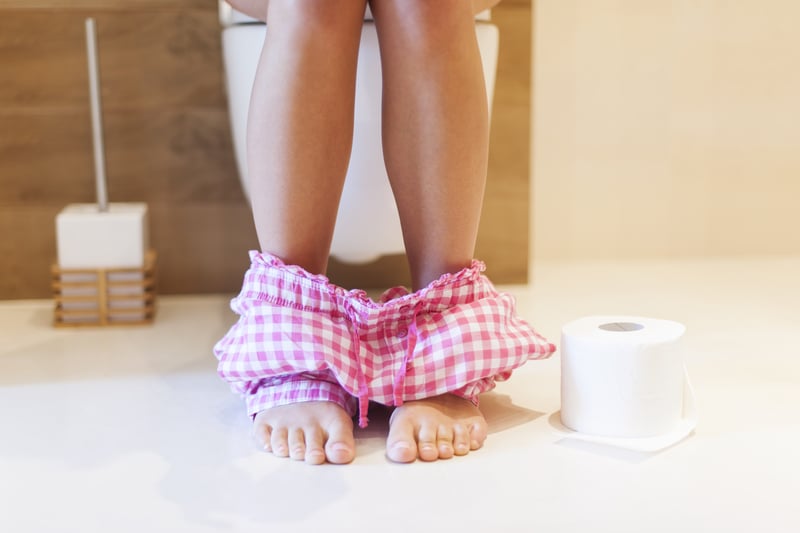All About Poop: What Your Poop Says About Your Health

While it’s not something we talk about when gathered around the dining table (at least in most homes), we all know that every body poops. It’s not only normal, it’s essential. What’s more, poop can tell a lot about your health status. Really, it’s something everyone should probably pay more attention to.
Poop (aka stool or feces) is the last stage of digestion. It’s what’s left of any foods and drinks you’ve consumed after the body has taken the nutrients it needs. It also contains bacteria and flora from the digestive system with salts and other substances and even sluffed off tissue from the intestine.
A “normal” poop can change from person to person. There is no “ideal” perfect size, shape, or frequency. Plus, simple changes in your diet can lead to changes in your poop. Other things that can change how the GI tract operates include hydration levels, medication use, health issues, and genetics.
That said, bowel changes can also indicate when something has gone wrong with your health. Here’s what to watch for when it comes to poop:
What Poop Color Means
What color should your poop be? If your first thought was “brown,” like the emoji💩, you hit the nail on the head. It can be a medium to dark shade.
Lighter (almost tan, yellow, or clay or chalk-like) colored poop may indicate that your body is fighting an infection or inflammation in the gallbladder, liver, or pancreas. It can also indicate inflammation in the liver caused by excessive alcohol consumption (i.e., alcoholic hepatitis). A bile duct block, which can lead to gallstones, can also lighten the color of poop.
Poops that lean toward yellow could indicate you’ve been eating more fat than usual or that your body isn’t absorbing fats. It may also mean you’re not absorbing nutrients from foods during digestion as you should (malabsorption). This could be due to illness, a food intolerance, or issues of the intestinal lining. Or, it could be a side effect of a medicine, such as one you’re taking for diarrhea.
The color red can indicate you’ve eaten a lot of beets, cranberries, or tomato juice (not a problem) or that you have blood in your stool. The blood may be caused by a small amount of bleeding caused by constipation, hemorrhoids, or tears. It may also be due to period blood for women.
However, if you’re seeing red, it can also be caused by more serious conditions, such as swelling in the stomach lining, something being stuck in the digestive system, inflammatory bowel disease (IBD), or even cancer. So, if you are seeing red, and you don’t have an obvious explanation, please set an appointment with your doctor for a physical exam, labs, or imaging tests to rule out any problems.
What about black poop? That’s again often due to the types of foods you’re eating. For example, if you finished off a bag of black licorice or jelly beans while watching a movie or, better for you, enjoyed snacking on a bowl of blueberries, your poop may look dark brown or even black the next day. The same is true if you have been given iron supplements due to anemia or if you’ve been using a medication that contains bismuth, such as Pepto Bismol.
However, if your poop has turned black without a change in diet, it could indicate something more serious, such as bleeding or even tumors in the digestive tract. Again, please seek a doctor’s advice for further testing and diagnosis if that’s the case.
What about turning a bit green? Have you been eating more green, leafy vegetables? That can tint your poop. Food coloring is also a common culprit for a color change. Greenish stools may also indicate there’s an overabundance of bile.
What Regularity Means
Do you ever wonder if you poop too much or not enough? While every body poops, there’s no set number of times you should poop. Some folks poop once a day, others twice a day, and others may only poop every other day.
What’s more important is that poops stay regular and that they’re normal for you. If you notice you’re pooping more or less often, pause, and think through the reasons.
It could be a change in your diet. Are you eating more or less fiber, meat, or dairy, for example?
What Poop Shape & Consistency Means
If your poops are watery and loose (sorry), and you’re going three or more times a day, then you’ve got a case of diarrhea. In other words, your body is trying to get something out of your digestive system, such as bacteria, parasites, viruses, or medications like antibiotics.
It may also be caused by a food intolerance. If you find, for example, that when you eat dairy, you suffer for a day or so, it’s time to listen to your body and avoid the problem food.
Other causes of frequent diarrhea include the stomach, small intestine, and colon diseases such as Crohn’s, irritable bowel syndrome (IBS), ulcerative colitis, and celiac.
Diarrhea is both common and typically short-term. If it lasts for more than a few days, though, check with your doctor. It can lead to dehydration quickly and then to more serious problems. So, watch it closely, and visit your doctor if it continues or is combined with other symptoms like weight loss, abdominal pain, or bleeding.
On the other end of the spectrum is constipation. That is, poop that’s hard, dry, painful to pass, and infrequent. Unless you’re a deer or a bunny, you shouldn’t be pooping out pellets.
Common causes include not eating enough fibrous foods such as fruits, vegetables, and whole grains; dehydration; being sedentary; and certain medications (e.g., antidepressants and pain killers). It can also be caused by more serious issues, such as irritable bowel syndrome (IBS). If symptoms don’t improve after several days and after you’ve added more fluids and fiber to your diet, it’s time to check in with a doctor.
While you don’t need to poop daily to be healthy, if you find that your poops are on a different schedule, if they’re causing you pain, or you have other symptoms, again, call up your doc. It’s better to address the problem than to try to resolve the symptoms on your own with, for example, laxatives. If laxatives aren’t used correctly, they can negatively impact the digestive system, causing further disruptions.
For the most part, poops should be fairly soft but well-formed “logs” that push out easily. If so, your digestive system is likely in good condition.
Does Timing Matter?
Most folks tend to have morning poops as the body has had a chance to process food overnight. But there’s nothing wrong with pooping at other times of day if that’s what your body does. Some folks have one in the morning and one in the afternoon, and that’s perfectly normal too. At the very least, however, people should poop at least three times per week.
It should only take a few minutes to poop—certainly less than 15 minutes. If you do find it’s taking longer to push it out, especially if you’re in pain or have to strain, then you either aren’t ready to go quite yet, or you’re constipated, have hemorrhoids, or have another condition.
What Poop Smell Means
Is there any other kind? Nope. Poops stink due to the bacteria within, which emits gasses. But most of us have a “brand” when it comes to poop that tends to smell familiar. If the scent changes—especially if the smell is really bad, leaving you running for a match or making your eyes water—this can signal a problem.
Especially foul-smelling feces can be a sign of malabsorption of nutrients, celiac disease, Crohn’s disease, chronic pancreatitis, cystic fibrosis, or an intestinal infection or stomach bug. It can also be caused by a dramatic change in diet. But again, if your diet hasn’t changed much, and you don’t get back to normal after a few days, this can indicate a need to check in with your healthcare practitioner.
Should Poop Float?
While most poops sink, typically, floating poops are no cause for concern. The most common cause is excess gas after eating more beans than usual or eating certain sugar alcohols, such as those found in sugar-free candies.
If you haven’t made these types of dietary changes, and especially if it’s accompanied by other symptoms, such as unexplained weight loss or abdominal pain, it could be a sign of malabsorption of nutrients, gastrointestinal infection, or pancreatitis.
Poop Problem Signs
Some of the most obvious signs of distress in the digestive system include:
- Pooping 3+ times per day
- Pooping less than 3 times per week
- Having to strain or having pain as you poop
- Off-colored poop, not explainable by dietary changes
- Greasy, smelly, fatty stools
- Blood in the stool or bleeding as you poop
- Loose, watery stools (i.e., diarrhea)
- Hard, dry, difficult to pass stools (i.e., constipation)
Every Body Poops: A Recap
While every body poops, it’s still probably not an appropriate dinner party discussion. That doesn’t, however, mean it should be ignored. Instead, pay attention to your poops and watch for unexplained changes.
Poops should be regular and familiar, and while you can expect changes if you’re eating more or less fiber or colorful foods, they can also indicate if your body is battling an illness and may need some help.
If your poops seem more, well, stinky than usual, don’t put off a doctor’s appointment. Early attention to an issue may help your digestion get back on track sooner and prevent more serious problems in the future. This is especially true if poops become painful or are accompanied by other symptoms.
Most poop problems, fortunately, can be best dealt with by making simple lifestyle changes. These include:
- Increasing the amount of water you drink to at least two quarts per day
- Eating more fiber-rich foods like vegetables, fruits, and whole grains along with a well-balanced diet
- Eating less highly processed foods and sugars
- Addressing any food allergies or intolerances
- Managing stress levels
- Being more active and exercising regularly
- Managing medical conditions, such as hyperthyroidism, inflammatory bowel disease, depression, and cancer.
If, however, you’re like most Americans, and you haven’t been eating as much fiber as recommended, please work your way up slowly to allow your digestive system to adjust.
Digestion can also be supported by avoiding certain foods like artificial sweeteners, chemical additives, and fructose. Boost your healthy microbiome by eating more naturally fermented foods like sauerkraut, pickles, and kefir, and/or using a quality probiotic supplement. It can also help to ensure you’re getting enough magnesium.





 7 Signs Your Body is Seriously Low on Collagen (not just wrinkles)
7 Signs Your Body is Seriously Low on Collagen (not just wrinkles) Health Expert: "Turmeric Doesn't Work (unless...)"
Health Expert: "Turmeric Doesn't Work (unless...)" 3 Warning Signs Your Probiotic Supplement is a Total Waste
3 Warning Signs Your Probiotic Supplement is a Total Waste

